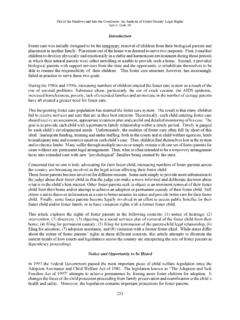Transcription of Out of the Shadows - Foster Parents' Legal Rights
1 Out of the Shadows and Into the Courtroom: An Analysis of Foster Parents Legal Rights Seth A. Grob, JD 221 Introduction Foster care was initially designed to be the temporary removal of children from their biological parents and placement in another family. Placement out of the home was deemed to serve two purposes. First, it enabled children to develop physically and emotionally in a stable and harmonious environment during those periods in which their natural parents were either unwilling or unable to provide such a home. Second, it provided biological parents with support services from the state and the opportunity to rehabilitate themselves to be able to resume the responsibility of their children. This Foster care structure, however, has increasingly failed in practice to serve these two goals. During the 1980s and 1990s, increasing numbers of children entered the Foster care system as a result of the rise of societal problems.
2 Substance abuse, particularly the use of crack cocaine, the AIDS epidemic, increased homelessness, poverty, lack of extended families and an increase in the number of teenage parents have all created a greater need for Foster care. This burgeoning Foster care population has strained the Foster care system. The result is that many children fail to receive services and care that are in their best interests. Theoretically, each child entering Foster care should receive an assessment, appropriate treatment plan and careful and detailed monitoring of his case. The goal is to provide each child with a permanent family relationship within a timely period. Timely is gauged by each child s developmental needs. Unfortunately, the realities of Foster care often fall far short of this ideal. Inadequate funding, training and under staffing, both in the courts and in child welfare agencies, leads to inadequate time and resources spent on each child s case.
3 Thus, children find themselves lost in the system and in chronic limbo. Many suffer through multiple moves or simply remain with one set of Foster parents for years without any permanent Legal arrangement. Thus, what is often intended to be a temporary arrangement turns into extended care with new psychological families being created by the state. Concerned that no one is truly advocating for their Foster child, increasing numbers of Foster parents across the country are becoming involved in the Legal action affecting their Foster child. These Foster parents become involved for different reasons. Some seek simply to provide more information to the judge about their Foster child so that the judge can make a more informed and deliberate decision about what is in the child s best interest. Other Foster parents seek to object to an imminent removal of their Foster child from their home and/or attempt to achieve an adoption or permanent custody of their Foster child.
4 Still others want to discover information in a case to better monitor its status and provide better care for their Foster child. Finally, some Foster parents become legally involved in an effort to access public benefits for their Foster child and/or Foster family or to have visitation Rights with a former Foster child. This article explores the Rights of Foster parents in the following contexts: (1) notice of hearings; (2) intervention; (3) discovery; (3) objecting to a social services plan of removal of the Foster child from their home; (4) filing for permanent custody; (5) filing for termination of the parent-child Legal relationship; (6) filing for adoption; (7) adoption assistance; and (8) visitation with a former Foster child. While states differ about the extent of Foster parents Rights in these different contexts, this article attempts to illustrate the current trends of how courts and legislatures across the country are interpreting the role of Foster parents in dependency proceedings.
5 Notice and Opportunity to be Heard In 1997 the Federal Government passed the most important piece of child welfare legislation since the Adoption Assistance and Child Welfare Act of 1980. The legislation known as The Adoption and Safe Families Act of 1997" attempts to achieve permanence by freeing more Foster children for adoption. It changes the focus of the child protection proceeding from family preservation and reunification to the child s health and safety. Moreover, the legislation contains important protections for Foster parents. Out of the Shadows and Into the Courtroom: An Analysis of Foster Parents Legal Rights Seth A. Grob, JD 222 Under the new federal legislation, Foster parents must be given notice of and an opportunity to be heard in, any review or hearing to be held with respect to the [ Foster ] child. 1 However, this provision does not make a Foster parent a party to such a review or hearing solely based on receiving notice and opportunity to be States needing to enact legislation to comply with this requirement and other substantive requirements have essentially two years to do so in order to receive federal funding under Title 4 of the Social Security Foster parents, pursuant to this new federal legislation, can expect the agency having Legal custody of their Foster child to provide them notice of all hearings affecting their Foster child s interests.
6 This will enable Foster parents to participate in or influence the Legal proceeding and the ultimate issues that the trial court and/or an administrative body will consider at each hearing. Further, at a minimum, it should permit Foster parents to testify and/or make a statement at every hearing about their concerns for their Foster child s welfare. Whether the language of an opportunity to be heard also entails the right to present evidence outside of their own personal knowledge through calling additional witnesses remains unclear. To safeguard this right and to better ensure full participation at every hearing, Foster parents must still seek leave to intervene formally as an interested party. Intervention When a dependency and neglect case is filed, the parties to the original action usually include the county department of social services ( the department ), the natural parents and the child (usually represented by the Guardian ad litem).
7 In some cases, a live-in boyfriend or girlfriend of the birth parents is also made a party to the proceeding and is called a "special respondent." These parties have the right to receive notices of all court hearings, discover and access reports, motion the court with specific requests, call witnesses and cross-examine opposing parties' witnesses. Foster parents are not parties to the original proceeding and therefore do not have many of these Rights . Foster parents who want to become involved in the pending Legal action must first become a "party" to the proceeding. The current trend is that state legislatures are increasingly enacting statutes allowing Foster parents to intervene as a matter of right if certain threshold requirements are met. For example, the Colorado General Assembly in 1997 enacted legislation which provides that " Foster parents who have had a child in their care for more than three months and who have information or knowledge concerning the care and protection of the child may intervene as a matter of right following adjudication with or without counsel.
8 "4 Such statutes do not give any discretion to the trial court judge in deciding the matter so long as the statutory requirements have been met. Other states provide for permissive intervention of Foster parents and typically follow Rule 24(b) of their state rules of civil In these jurisdictions, the trial court is given wide discretion whether to allow Foster 1 42 USCA 675(5) (West 1997). 2 Id. 3 42 USCA 501. 4 Colo. Rev. Stat. 19-3-507(5) (1997); See also Soc. Serv. Law 383(3) (1997) ( Foster parents having had continuous care of a child, for more than twelve months, through an authorized agency, shall be permitted as a matter of right, as an interested party to intervene in any proceeding involving the custody of the child. Such intervention may be made anonymously or in the true name of said Foster parents. ) 5 See , 24(b) ( Permissive Intervention. Upon timely application anyone may be permitted to intervene in an action: (1) When a statute confers a conditional right to intervene; or (2) when an applicant s claim or defense and the main action have a question of law or fact in common.)
9 In exercising its discretion the court shall consider whether the intervention will unduly delay or prejudice the adjudication of the Rights of the original parties. ) Out of the Shadows and Into the Courtroom: An Analysis of Foster Parents Legal Rights Seth A. Grob, JD 223 parents to In making this determination, courts often look at the following factors: (1) whether the Foster parents participation will enhance the knowledge and judgment of the court in making a best interest determination; (2) whether intervention is necessary to elicit full and accurate information pertaining to the welfare of the child; (3) the reason Foster parents are seeking to intervene; (4) whether Foster parents have a recognizable liberty interest in the continuation of this new familial relationship7; and (5) whether the Foster parents interest is adequately represented by any of the litigants. Once Foster parents have intervened in a dependency action, the precise Rights bestowed upon them are not entirely clear.
10 It is expected, however, that party status entitles Foster parents to receive notices of all hearings, have access to court reports, voice their concerns about the child's welfare directly to the court, file motions seeking additional services for their Foster child and present testimony about the child s welfare. Foster parent intervenors are usually also in a position to object to their Foster child s removal and/or seek custody of the child when the child has been in their long-term care. In essence, once intervention is obtained, Foster parents are better able to monitor the status of the case, negotiate with other parties and influence the court on behalf of their Foster child. Discovery As parties, Foster parents should arguably have the right to discover relevant evidence about the dependency case and specifically about their Foster child. Evidence may include the department's notes detailing contacts and visits between the natural parents and the child and descriptions and observations of their relationship; notes relating to the parents' compliance, or lack thereof, with the court-ordered treatment plan; therapists reports; and court ordered evaluations.










